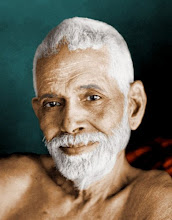God has created the world in play. – Sri Ramakrishna
A simple, childlike story in India’s ancient scriptures tells how multiplicity emerged from unity. The Lord, the One without a second, felt very lonesome one morning. After all, he was the only thing that existed in the entire universe, so when he looked around him, he could see no one but himself. This did not satisfy him at all. He wanted to play.
So he made playmates. Out of himself he created the myriads of creatures, the two-footed and the four-footed. He started playing with them, playing hide-and-seek, which is what life is all about. We are all playing this game with the Lord. We are all seeking him, and he is hiding playfully from us.
It is easy to talk about this, sing about this, paint this, but it is an entirely different matter to experience it. Yet in deepest meditation, the veil separating you and me can drop. Then, beneath the varied costumes, we will be able to perceive the same supreme Reality whom we call God, who is playing his game in the world.
--Eknath Easwaran
I have heard it said that myths can convey truths that literal accounts of reality cannot. Or myths can convey these truths more effectively because they resonate with deeper levels of consciousness. I've never found this to be true in my case, but maybe that's my failing and doesn't apply to people in general.
However, of all the myths I have ever heard about God, the universe, and human beings and how they all relate, the Hindu myth that Easwaran recounts above with his characteristic clarity and succinctness seems the truest and affects me with the most force. I have questions, such as why a perfect God would ever need to entertain Itself by unknowingly playing all of these imperfect roles that it ultimately seeks to see through so that it can regain its state of perfection from which it will then seek to divert Itself. But I still believe that it is the best myth yet devised, or of which I'm aware, to address the fundamental questions about existence and undergird a wisdom tradition worthy of the name.
A Few Words About Words
-
*Language*.
there is no philosophy without it, inasmuch as it lies at the basis of all
thought; on the other hand, philosophers will be seduced by it as ...
6 hours ago



No comments:
Post a Comment